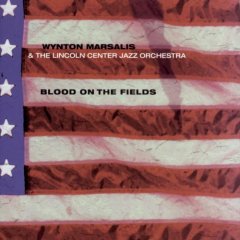It’s 1994 and it’s opening night for Wynton Marsalis’s Blood on the Fields – an extended jazz oratorio on the condition of American slavery. The narrative unfolds and the music courses through elements of work songs, call and response, blues, ragtime, and jazz. The audience realizes that Blood on the Fields is far more than yet another story of racial degradation. 
Blood on the Fields, as Stanley Crouch wrote, is “An epic truth-telling of the national condition of slavery, that pushes against the Constitution, disregards the Christian underpinnings of the nation. It molds our politics, our military history, our arts, the Civil War and its echoes, the Harlem Renaissance and the Civil Rights Movement.”
The Lincoln Center audience follows Jesse and Leona from the slave ship to the auction block to the plantation. Jesse, a prince in Africa, leans on Leona. Her great strength shows not only Jesse, but the audience and all Americans, how to face truth, how to survive, and how to be truly free. Blood on the Fields, says Wynton Marsalis, teaches, “what it takes to achieve soul: The willingness to address adversity with elegance.”
Blood on the Fields became a true cultural force and agent for change. It was awarded the Pulitzer Prize for Music in 1997 – the first work of jazz to be so honored. Marsalis’s oratorio opened the door for previously ignored jazz works by Duke Ellington, George Gershwin, Thelonious Monk, and John Coltrane to receive posthumous recognition.
“Soundtrack to the Struggle” is hosted by Hollis Monroe. Produced by Ron Adkins. Executive Producer is Dennis Green.
Podcast (soundtrack): Play in new window | Download
Subscribe: Apple Podcasts | RSS


